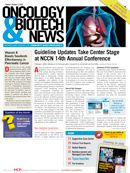Publication
Article
Metastatic Breast Cancer Worldwide: Different Languages, Different Views, Different Goals
Author(s):
Breast cancer in general is not openly discussed in Malaysia, but this may be changing.
Women in Malaysia diagnosed with metastatic breast cancer don’t prepare for life with a serious chronic disease. They prepare for death.
“Cancer is cancer,” Dr. Ednin Hamzah, technical advisor of the Malaysian Breast Cancer Association says. “Cancer is death.” With only about 40 oncologists in the entire country (32 of them in capital city Kuala Lumpur), about 60% of the women diagnosed with breast cancer have advanced metastatic disease. Many will die from it. “Access to care is completely irrelevant to many patients,” he says. “You just can’t get it.”11
As a result, the goals of these women are different. “Most women with MBC are not really concerned with the disease,” he says. “They’re more concerned with day-to-day issues like pain and symptom control and keeping their family together, which is highly important to many of them.”
Breast cancer in general is not openly discussed in Malaysia, but this may be changing. When Malaysia’s well-liked former first lady, Endon Mahmood Ambak, died of MBC in 2005, “the whole country mourned the loss of this wonderful woman, and many of my patients expressed relief,” Dr. Hamzah says. “They said, you know, it’s okay to talk about it because even the most powerful woman in the country couldn’t beat this.”
As in Malaysia and other developing countries, Mexican women with MBC suffer from lack of access to medical care. Many Mexican women, according to some breast cancer advocates familiar with the country, live far away from hospitals and doctors. If they do manage to see a doctor, they are often faced with language and literacy barriers.
At first blush, one might think clinical trials would be a perfect fi t for women living in developing or underserved countries like Mexico who can’t afford medical care and who may benefi t from an on-site hospital stay. Unfortunately, that’s not the case. Doctors are reportedly hesitant to get involved in clinical trials because they fear further stretching of their budgets and staff. Having more patients in clinical trials means more patients in the hospital, more frequent follow-up visits, and more of a drain on already scarce resources.
Providing patients with take-home support materials written in a woman’s native language and in understandable terms, something taken for granted in Westernized countries, might be a way to start easing the burden on Mexican doctors and make them more receptive to getting involved, some advocates suggest.
Brazilian women with MBC encounter similar barriers. “There are two kinds of people in Brazil,” says Vitoria Herzberg of the Brazilian Cancer Association. “The twenty percent who have access to private insurance and the other 80%, who use our public health system; this major group is so politically uncultivated and unaware of their rights as citizens that when we do give them information, they are not able to assimilate it.”
Cultural Differences Know No Borders Cultural differences affecting the way healthcare professionals and others reach out to women with early and metastatic breast cancer also exist within “Westernized” countries, even in the United States. Though women here may have routine access to the Internet, libraries, community clinics and informational booklets, some channels are more effective at reaching them than others.
Black and Hispanic women here, advocates observe, are often better reached through churches and female leaders within them. Some Black women in the United States, Dr. Marisa C. Weiss, president and founder of Breastcancer.org discovered, are especially wary of entering clinical trials because of atrocious historical ‘experiments’ on Blacks in the U.S., such as the infamous 40-year ‘Tuskegee Experiment’ involving hundreds of Black men diagnosed with syphilis who went untreated for decades. “Trusting their doctor is critically important,” she said.
Educating men about their risk of breast cancer is even more daunting. Although a relatively small number of men (2,000) in the United States are diagnosed with breast cancer each year,12 it has usually metastasized beyond treatment by the time it is discovered, simply because it is considered “a woman’s disease” and a breast lump is likely to be ignored.
Canada is a vast country with 10 large, distinctly different provinces and three territories. Not all of them speak the same language, and many present severe travel challenges. This has prevented the delivery of a consistent message to residents about breast cancer in all of its stages.
Whether in Malaysia, or Africa, or South America, or any of the countries considered “Westernized”, advocates agree women with metastatic breast cancer will pay more attention to a message delivered by someone who reminds them of themselves. As Ms. Knox of Europa Donna says: “We need to make sure we have an Italian in Italy, a Romanian in Romania, and so forth. Sending people from one country to the next is not going to be as effective. People need to see someone from their own culture and background who’s willing to stand up and speak.”
